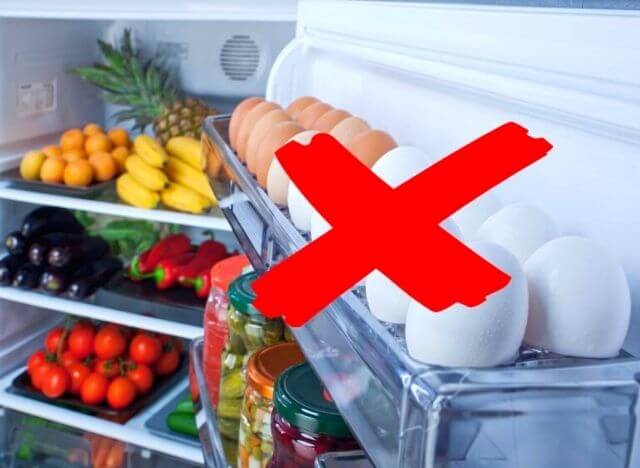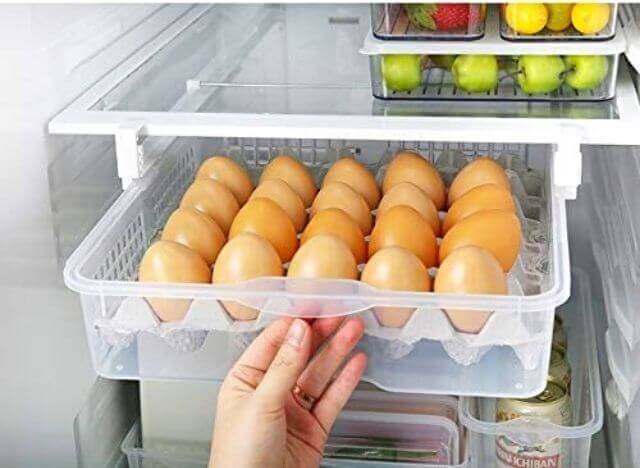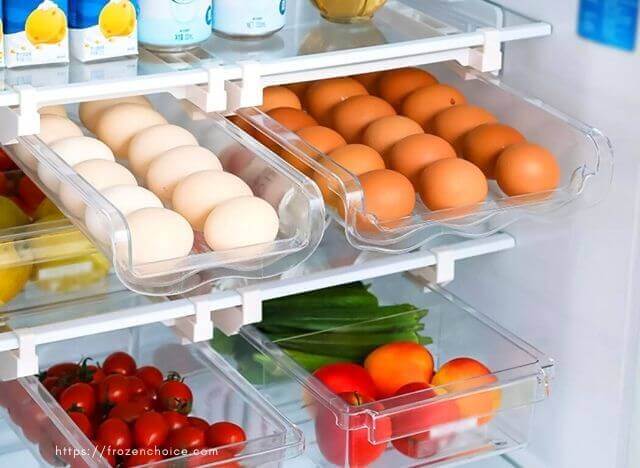Eggs are very familiar in many family meals, especially for busy people. You can buy a lot of eggs to store in the refrigerator for later use. This is a good habit. It is not only convenient when you need some eggs for a quick breakfast, but also save time of going to the supermarket. However, if you leave the eggs in the refrigerator for too long, or store them in a wrong way, they will easily go bad. So, how to keep eggs fresh and safe when storing them in the refrigerator?
Why should you store eggs in the fridge?
Refrigerating is a perfect choice to preserve your eggs fresh and safe for a long time. However, you should use proper containers so they can stay safe inside the refrigerator for about 3 to 5 weeks since the day putting them in fridge. In addition, storing eggs in the fridge also helps to keep bacteria under control and slowdown their growth inside the eggs.
When storing fresh eggs at room temperature, they will lose quality in a few days. You need to use them within 2 or 3 weeks to ensure freshness.
Further reading: Which Refrigerator is the Best for a Family with 4-5 Members?
What to know when storing eggs in the refrigerator
To keep eggs fresh and safe in the refrigerator, you need to note a few things:
- Do not keep eggs in the refrigerator door: The door is often opened and closed so the temperature will fluctuate and affect your eggs, make them spoil easily. You should put eggs deep inside the cabinet or in the drawers to ensure the consistent and cool temperature.

- Do not leave eggs the fridge for too long: Keep them in fridge about 3-5 weeks. Once eggs have stored in the fridge, you should not take them out outside, then put them back in the refrigerator. This will damage the eggs and make them spoil faster.
- With leftover raw egg whites and yolks: It is recommended to put them in airtight containers and stored in fridge as soon as possible. The yolks may dry out, so to prevent this, you can cover them with a little cold water. However, remember to drain the water before using or cooking.
- With hard boiled eggs: You may smell a “gassy” odor inside the fridge after a few days. Do not worry. The odor is not harmful and would disappear soon.
How to store eggs in the refrigerator to keep them fresh and safe?
Some steps to properly store eggs in the refrigerator, as follows:
- Wash eggs before storing in the fridge: In fact, the eggs are are laid with a natural coating on the shell, which protects the eggs from air penetration and bacteria. However, during transportation and storing, the bacteria may appear on eggshell. So, to make sure the eggs are clean, you should wash them to remove stains and bacteria that cling on the shells. Wait for the eggs to dry out, then use a soft, wet cloth to wipe them completely.
- Keep the large end up: To make the eggs last longer, they should always be stored with the big heads facing up, the same way they are packaged in the carton. This helps the yolk remain centered.
- Use proper containers: You should put your eggs upright in a carton or plastic box. These containers will protect and keep the freshness of your eggs in the refrigerator compartment.
- Label the “Best Before Date”: Keep the Best Before Date always visible to you and make sure to use your eggs before the expired dated.
- Set the right temperature: Eggs will be safe in the fridge set at 40 °F or slightly below. You should store immediately after bringing them home.

What are common mistakes when storing eggs in refrigerator?
- Do not wash eggs: If eggs are not washed thoroughly, they can bring bacteria into your refrigerator.
- Keep eggs uncovered in the fridge: Using a proper container for your eggs will help to protect them safe in fridge. Besides, they do not spread any odor from others which can change their flavor.
- Do not remove the cracked eggs: You should check and discard the cracked egg. If not, they will spoil very fast, and the bacteria will grow inside your fridge.
You may also like: Best Top-Freezer Refrigerator without Ice Maker
FAQs
How to know if your eggs are fresh or not?
Check the expired date
This is the easiest way to know exactly if your eggs are fresh or not.
Check by eyes
If you see the following signs, you should not use them.
- A crack on the shell: Eggs with cracked or slimy shells are very susceptible to infection.
- Powder on the shell: Powdery mildew could be a sign of mold.
- Shell is broken.
Drop eggs in water
You can gently place your egg in a glass of water and observe.
- Fresh egg: If the egg sinks quickly and sits on the bottom of the glass horizontally, it means the egg is still fresh.
- Egg which is a bit old (about 1 week): The egg will be on the bottom and slightly floating in the middle of the cup. You can safely use it.
- Old egg (about 3 weeks): Egg will stand in balance with the pointed end facing down and the big head turning up. It is not very fresh but still fine to eat.
- Spoiled egg: The egg will float to the surface, it’s a sign that the egg is spoiled, and you shouldn’t eat it anymore.
What happens if someone eats the spoiled egg?
If you eat spoiled eggs, you will be infected with Salmonella bacteria. This is a type of bacteria that causes intestinal infections. Salmonella can grow both on the shell and inside the yolks and whites. When infected with these bacteria, you will suffer from food poisoning with symptoms like diarrhea, abdominal cramps, fever, and vomiting.
How long can different kinds of eggs be safe in fridge?
It is recommended for storage time with eggs as below.
- Fresh shell eggs: the best date is the expired date
- Leftover yolks or whites: used with 2 to 4 days
- Hard boiled eggs: better used in 1 week
- Pickled eggs: can be best within 1 month
- Frozen whole eggs (blended) should be used within 4 months
The bottom line
Storing eggs in the refrigerator is a perfect solution to keep eggs fresh for a long time. You can save money and time as well as good for your health. Hopefully, you can apply some steps to keep eggs fresh and safe in fridge.
Reference
Egg Storage, Freshness & Food Safety, eggs.ca, Retrieved on Jan. 8, 2022

